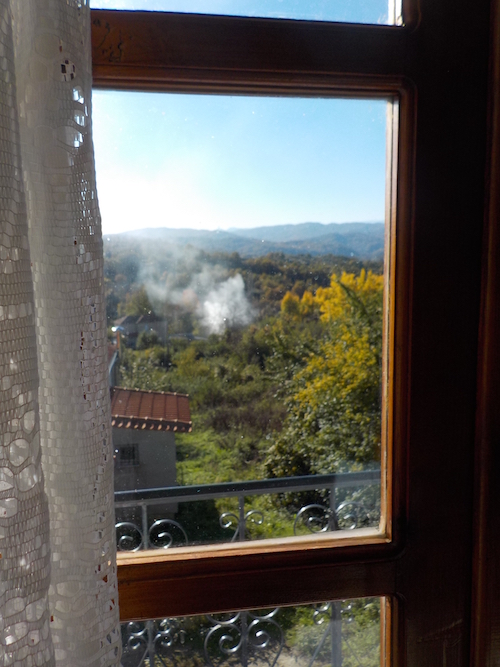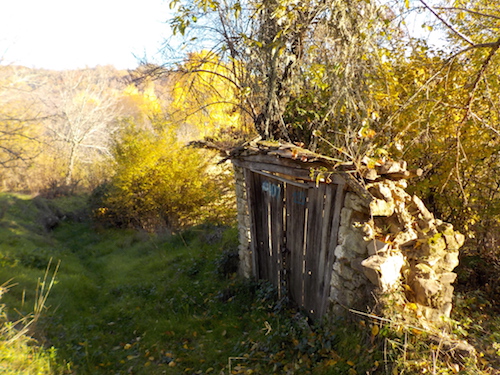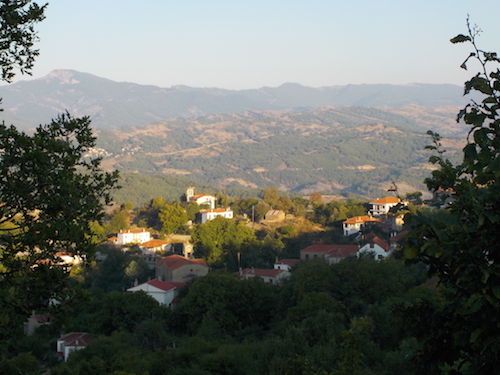Four Poems
Having Been Away Most of My Life
After the noon meal, I bring fish bones out for the cats, clear the plate onto the grass. Red roofs in sunlight. White walls in sunlight. An iconostasi’s white cross against the blue. I am still here, a boy, in ways, still. Though newness has faded, the relief of being in either elsewhere, otherness, having shuttled between village and Connecticut so many times. There is less escape now, less fulfillment; more fatigue, a closing in. Is it the time in history—a collapse, the culmination of poisonous pursuits and values— that’s brought on this lethargy? Or no longer being young? Have I used up the running away’s allotted me, having run away too much, so that running away and the where’s have become prison-like, village or America? Sitting still has filled with running away. Being present seems tainted. Where is there, then? And what, if anything? Can the dark room near dusk do?

My Mother Waiting
Years in the village. My father in America. Not sharing the mornings, the mountains, the rose bush, the air. Moving past the yellow hills, the blue, the almond blossoms, separately, in separate countries. After he died, she rebuilt our falling house and went on waiting. The old plum gave sweet golden fruit, the yard with grape vines, mint, laurel, a fountain she put in, quince, pear, cherry, parsley, a space for a car to pull in, the gate made wide to fit a car. She cooked rice pilaf in the outdoor kitchen, stocked firewood, had radiators installed for winters, bought toys and kept them in the closet, waiting for my brother and his girls to visit. She filled the refrigerator, adorned the house with promise, with knit things, trinkets, pictures of us. I remember the first signs of her letting go. I was returning, on break from school. I opened the door; she didn’t get up to greet me; she had always greeted me with real warmth and brightness. As though love had gone from her or was bigger than what I had imagined. She wasn’t angry; she had taken a turn, heading somewhere else suddenly. After she died, days alone in the house, I wondered how the light coming through the windows and balcony door would seem to her. I looked at the phone on the small stand, the stool where she’d sit Saturdays at five waiting to hear from us across the ocean. People go, we cannot see or talk to them, anymore, they cannot touch us with their hands.

How I Became a Poet
Growing up in my village when nobody had a car we took the weekly bus to the market town. The driver was an idol, floating on his kingly springy seat, his gift and rare authority—controlling the huge machine with his fingers. The sign above his head read: DO NOT DISTURB THE DRIVER. Whatever the true driver is in one becoming anything I didn’t become a bus driver. Later I read philosophy, from lack and pride and greed—a poisoned hunger—trying to catch up with the smart people. Jean-Jacques Rousseau, Kierkegaard, Sartre, the King James Bible. I wrote obtuse notes in the margins of books I understood close to nothing of. My father had a pizza place but I didn’t want to do that for the rest of my life, fulfilling some script for tidiness or American dream and family values that helps others under capitalism cope with their own participation in the project, giving a picture of cohesion and fresh baked bread to it—the wrong happiness. I quit school, went back to school, went back to my village. The old people had died. Childhood friends had moved on. The village itself was dying. Not the land. The stone houses were falling. Trees and weeds grew wild. Abandoned almonds blossomed in spring. Birds returned, as always. Flies wove their hum. Silence and life.

Mother
The world is so large. How did you keep your faith in joy all those years? Airplane rides where sometimes you liked the meals especially and told your friends on the phone after returning to America. I’d listen from my room, stomach down, in bed. “They prepared for us a very tasty fish,” you’d say with real sharing. Being alone and needing to pretend to know, to be, what our village mocked you for, Americana, some sense of what they thought cosmopolitan and privilege. They treated you with jealousy and hate. “The Americana is here,” they’d say on your arrival in the village, you who spoke no English and became an outsider in the only place you called home, pushed there by friends and relatives. Years on the airplanes, terrorized by the cards you didn’t know how to fill out, trying to befriend strangers, to find someone to talk to who maybe came from our parts.

Tryfon Tolides was born in Korifi Voiou, Greece. His first book manuscript, An Almost Pure Empty Walking, was a 2005 National Poetry Series selection, published by Penguin in 2006. His poems have appeared in literary journals and magazines including America, Atlanta Review, Mondo Greco, Poetry Daily, Washington Square Review, and Worcester Review. He studied at Boston University, and Tunxis Community College, and graduated from the University of Maine with a BFA, and Syracuse University with an MFA. In 2009, he received a Lannan Foundation Writer Residency in Marfa, Texas.
Editor's Note: For the poet's exclusive interview with Artemis Leontis see here
